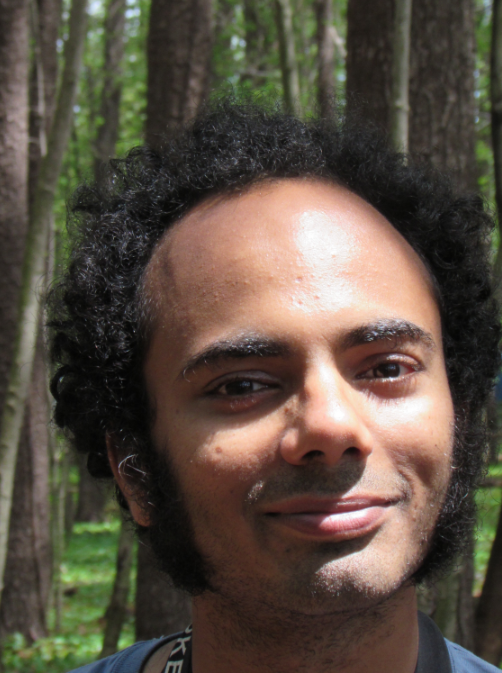Faculty Spotlight: Sulmaan Khan
Returning again to the Faculty Spotlight series, today we’ll read about Professor Sulmaan Khan, who is actually on sabbatical this semester. When he rejoins us at Fletcher in the spring, he will teach The Historian’s Art and Current Affairs and Foreign Relations Of Modern China, 1644 to the Present. He also teaches China’s Frontiers.
FRAGMENTS OF A FLETCHER LIFE
 Fall — one of those glorious New England fall days when you long to feel the wind in your face. “We’re going outside today,” I announce to the class. Nods of approval. We settle down on the grass, the leaves red and gold around us, and talk of Chinese foreign relations. Later, trying to write about it, I will forget what it was we discussed that particular day. (It was too late in the semester for Koxinga, that crazy warrior whom Japan, Taiwan, and China all claim for their own; it was too early for Deng Xiaoping, with the pragmatism he brought to China and the carnage he unleashed at Tiananmen Square. We could have been talking about the Taiping rebellion or we could have been talking about the Korean War — as I say, I cannot be sure). But I will remember the red-tail.
Fall — one of those glorious New England fall days when you long to feel the wind in your face. “We’re going outside today,” I announce to the class. Nods of approval. We settle down on the grass, the leaves red and gold around us, and talk of Chinese foreign relations. Later, trying to write about it, I will forget what it was we discussed that particular day. (It was too late in the semester for Koxinga, that crazy warrior whom Japan, Taiwan, and China all claim for their own; it was too early for Deng Xiaoping, with the pragmatism he brought to China and the carnage he unleashed at Tiananmen Square. We could have been talking about the Taiping rebellion or we could have been talking about the Korean War — as I say, I cannot be sure). But I will remember the red-tail.
A pair of red-tailed hawks has been nesting near Fletcher at least since I started here in 2013. And as we talk, one of them comes soaring in upon the winds — a huge chocolate-brown and white hawk, the red tail like fire in the autumn sky — to land in the tree behind us. I pause, mid-lecture, to point it out to the class. For a large bird, the red-tail can be astonishingly adept at hiding; this one chooses to blend almost entirely into the branches. I wait till everyone has seen it before carrying on. It is important, of course, to know the details of China’s past. But you cannot let magic pass you by, and there is something magical about red-tails.
*
As geniuses go, Bismarck is an astonishingly divisive figure. (But then, so too is Henry Kissinger, who wrote more insightfully about Bismarck than any other historian). I have been trying to explain Bismarck’s problem to my class on The Historian’s Art and Current Affairs: his diplomacy was too complex, too intricate for most people to understand. There was shock, horror when his successors discovered the treaties he had made, the web of alliances and obligations virtually impenetrable to them. Good as he was, I tell the class, he could not prepare the way for his successor.
“I don’t think he can be called good then. That level of disorganization is unacceptable,” says one of my students. A good leader, she explains, creates a system and grooms people who can work it.
“But is it is his fault?” I ask. “Can you blame him if no one else was quite smart enough to understand how the treaties worked?” This is the central argument about Bismarck, and the class — a confident, stimulating bunch — will be at it for the rest of the session.
“He could have color-coded them,” says another student decidedly. She has, I have to acknowledge, a point there.
*
Ellen McDonald is our research librarian, and, as I invariably tell students working on their capstones, the smartest person at Fletcher. She knows almost everything and what she doesn’t know, she knows how to find out. She is also incredibly idealistic. She believes deeply in the holy myths of academe, in its commitment to seeking truth, the freedoms it grants you for that quest. She has spent time in jail for protesting defense policies she found abhorrent; she has been a foster mother to numerous children. She is as formidable a combination of intellect and heart as one can encounter, and I always come away from conversations with her feeling inspired.
Today, Ellen is talking about elephants.
“Do you know that in the time we have been talking an elephant has been slain?” she asks.
I do know that. In my heart of hearts, I still want to be a naturalist.
“I’ve created a research guide on illegal wildlife trafficking,” she says, punching it up. It is an impressive piece of work.
“We have to save the elephant,” Ellen tells me. “Are you in?”
How could I not be?
*
In spring, students’ minds turn to their futures. For the second years, there is the job hunt. For first years, the questions are, if not as pressing, perhaps more tortuous. “What is the best way of using this summer to ensure I get a job next year? Can I balance what I want to do with the responsible thing to do? If I do something this summer and don’t like it, can I do something else next year, or has the chance been missed?”
A student has come to me with a gleam in her eye and a ramble planned: she wants to take the Trans-Siberian railway. It is a glorious trip: she will meet people she would never have dreamt of, see Russia and China the way few people have. For a student of international affairs, it will be a learning experience better than any internship. I am proud that she is brave enough to reach for this.
“Take the train,” I say. “You won’t regret it.” I feel a surge of gratitude for my own teachers, for their wisdom in telling me to trust my instincts and take a trail even if I didn’t know where it would lead. One has an entire lifetime to be grown-up and responsible; giddy adventure just might be good preparation for that lifetime. At the very least, it will be fun.
She takes the train. She writes to me in Russian a few months later. She has had a grand time.
*
At graduation, one of the speakers talks about the problems the world faces: the poverty, the inequality, the death penalty and how it is still practiced in Boston. She is passionate; she is logical; she is all one hopes a speaker would be. “What did you think of it?” students ask later. “We hear some people thought it might not be appropriate.”
“I loved it,” I say. It is their day and they deserve all the congratulations coming their way — but it is wise to temper those congratulations with a reminder that there is work to be done. “I don’t want you to get too comfortable,” I say. “And I’m glad she didn’t let you.”
 I think about this as I walk back down towards the Davis Square T-stop. I will not be back to the comforts of Fletcher next fall: a sabbatical has rolled around, and I will be off in Asia, doing research for a book on Sino-Japanese relations (at least, that’s how it starts out. Books are living things; they become what they want to become, regardless of what you plan for them). One needs a change to stay fresh, and I am glad for the chance to head to Japan, China, and Taiwan, to see new places and hear new things. But I will miss Fletcher. It is like nowhere else I know.
I think about this as I walk back down towards the Davis Square T-stop. I will not be back to the comforts of Fletcher next fall: a sabbatical has rolled around, and I will be off in Asia, doing research for a book on Sino-Japanese relations (at least, that’s how it starts out. Books are living things; they become what they want to become, regardless of what you plan for them). One needs a change to stay fresh, and I am glad for the chance to head to Japan, China, and Taiwan, to see new places and hear new things. But I will miss Fletcher. It is like nowhere else I know.
A shadow falls on the grass, and I look up. Overhead, a red-tail is climbing in lazy spirals. It circles once more as I watch, then veers off towards Fletcher and is gone.